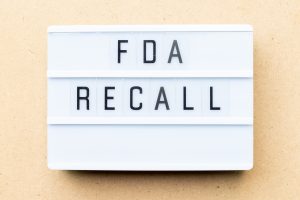The Food and Drug Administration Pulls Zantac from Pharmacy Shelves
 Earlier this week, the U.S. Food and Drug Administration issued a news release requesting manufacturers to withdraw all products containing the popular heartburn drug, ranitidine, the active ingredient in the medication, Zantac. The order applies to both prescription and over-the-counter medications. In light of the ongoing COVID-19 national emergency, those who have medicine containing ranitidine on hand are being asked not to return the product to the pharmacy, as is typically recommended. Instead, the FDA is recommending the medication be destroyed according to the disposal suggestion contained in the medication guide or package insert. All formulations of ranitidine are impacted, including pills, injections, and compounded medications that include ranitidine.
Earlier this week, the U.S. Food and Drug Administration issued a news release requesting manufacturers to withdraw all products containing the popular heartburn drug, ranitidine, the active ingredient in the medication, Zantac. The order applies to both prescription and over-the-counter medications. In light of the ongoing COVID-19 national emergency, those who have medicine containing ranitidine on hand are being asked not to return the product to the pharmacy, as is typically recommended. Instead, the FDA is recommending the medication be destroyed according to the disposal suggestion contained in the medication guide or package insert. All formulations of ranitidine are impacted, including pills, injections, and compounded medications that include ranitidine.
The recent recall is the latest step in an escalating investigation surrounding a contaminant known as N-Nitrosodimethylamine (NDMA), which is commonly found in ranitidine. Through its research, the FDA found that the impurities in some ranitidine products increase over time when stored at higher temperatures, potentially resulting in dangerous levels of NDMA.
In its official statement, the FDA explained that it didn’t see unacceptable levels of NDMA in the many samples they tested. Nevertheless, since they did not know how or for how long the product might have been stored they decided that it should not be available to consumers and patients unless its quality could be assured.
NDMA is listed as a well-known human carcinogen. NDMA is found in trace amounts in food and water, and ingestion of small quantities is not expected to result in an increased risk of cancer. However, at high levels, the substance can be very dangerous and life-threatening.
If you or a loved one took Zantac and developed stomach/gastric, liver, small intestine/colorectal, bladder, kidney, prostate, esophageal, or pancreatic cancer, our Zantac injury lawyers are able to represent you in bringing a product liability claim against the makers of Zantac.
In 2019, the FDA discovered that NDMA was frequently found in ranitidine. Through recent third-party laboratory testing, the FDA confirmed that the level of NDMA in ranitidine was not only present in large amounts but could also increase over time, possibly reaching hazardous and lethal levels. Notably, the increase in NDMA occurs at rapid levels when the medication is stored at higher temperatures, but data indicate that an increase in NDMA concentration still occurs even in lower temperatures. Thus, the older medication is, the more NDMA it will likely contain.
The FDA has not ruled out that ranitidine may be available in the future. However, before a company would be able to sell a product containing ranitidine, it would have to show significantly decreased levels of NDMA and that the levels present did not increase over time.
Have You Been Diagnosed with Cancer after Taking Zantac?
If you or a loved one has recently been diagnosed with stomach/gastric, liver, small intestine/colorectal, bladder, kidney, prostate, esophageal, or pancreatic cancer after taking Zantac or another heartburn medication containing ranitidine, contact Moll Law Group for immediate assistance. Lawsuits against pharmacies and drug manufacturers are often exceedingly complex, and should be handled by attorneys who are familiar with these unique cases. Our dedicated team of product liability attorneys has extensive experience helping those who have been injured after taking dangerous pharmaceutical drugs. We represent consumers injured by defective products as well as in other states nationwide, including Illinois, California, Florida, New York, Texas, Pennsylvania, Ohio, and Michigan. Call us at 312-462-1700 or use our online form to set up a free consultation.
 Illinois Injury and Mass Tort Lawyer Blog
Illinois Injury and Mass Tort Lawyer Blog

